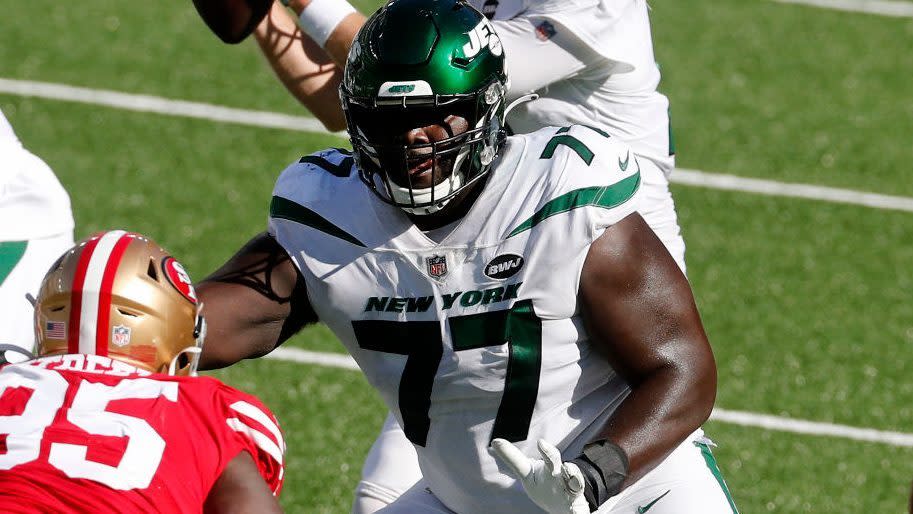The Dolphins went a long way toward knocking themselves out of the playoffs on Sunday (it will be official if the Colts beat the lowly Jaguars in the late-afternoon slate) and did so in spectacular fashion—losing to the Bills, giving up more than 50 points and in the process, sowing doubt into what should have been an uplifting offseason for a team peaking ahead of schedule.
The reason for allegedly impending chaos was a disastrous performance from rookie quarterback Tua Tagovailoa, who threw three interceptions on Sunday and despite attempting more than 50 passes, averaged a meager 5.7 yards per attempt on the day. Despite going three-of-six on deep shots beyond 20 yards, most of Miami’s game plan was centered around routes of 10 yards or fewer. On those intermediate passes, Tagovailoa struggled, especially over the middle. He completed a single pass on balls thrown between 10 and 20 yards. According to NFL’s Next Gen Stats, Tagovailoa had the second-worst completion percentage below expectation of the early games, hitting on 15% fewer of the balls than he should have. The only quarterback playing worse was Cincinnati’s Brandon Allen.
So came the chorus of doubters who have been omnipresent around Tagovailoa this season. This noise isn’t likely to quiet, given that their ridiculously fortunate trade with the Texans will likely net them a top-three draft pick in the spring and another good shot at a top-tier quarterback if they so choose. It did not help matters that Brian Flores has been quick to pull Tagovailoa at various points throughout the season, allowing for Ryan Fitzpatrick to remain a somewhat incidentally delegitimizing presence for the former Alabama star.
Many of us tend to live every Sunday in a vacuum devoid of perspective, especially these days. On Sunday, this was undeniably true of anyone honestly believing that Miami should do anything but build around Tagovailoa this offseason.
Yes, the Dolphins blew it on Sunday with their 56–26 loss. They could have been a factor in the playoffs. They have a talented roster that is good enough to win now. But they also have a good nucleolus moving forward, which factors the young quarterback into the equation. The immediate reaction to Sunday’s performance doesn’t consider a notably conservative game plan that has dogged Tagovailoa this year, along with at least 11 dropped or fumbled balls (as The Miami Herald noted Sunday). Three of his top receivers on Sunday all netted fewer than the league average in terms of average separation on a given snap, meaning that tight-window throws were especially so on Sunday, even though only 10% of his passes could be deemed “aggressive” technically.
Before Sunday, Tagovailoa was hitting on 65% of his passes while being pressured, which is a better completion percentage on difficult throws than Peyton Manning amassed on all throws over his first four NFL seasons. His Bad Throw Percentage, 18.3%, was the same as Patrick Mahomes’s back in 2019—the year Kansas City won the Super Bowl. In college, Tagovailoa was behind only Joe Burrow in terms of catchable balls thrown percentage, and was near 80% in on-target passing. All of this needs to be digested before going along with the panicked narrative that Tagovailoa is somehow now all of a sudden not the player we imagined him to be coming out of college.
The smart play for the Dolphins would be to realize that they must use their time and capital this offseason to lean further into what makes Tagovailoa tick, not to spend hard-earned capital on a situation that will only continue to muddy his future. Let what is happening in Philadelphia be not a lesson in preparedness, but a case study in how messy adding another young quarterback into the fold can make a previously stable situation.
Tagovailoa was running an offense in 2020 designed by Chan Gailey, a coach who has a long history with Fitzpatrick and a tendency to favor conservative game plans. And while this may sound like simply a long list of excuses, it’s meant to be a long list of counterweights to the inevitably hefty opinion that somehow, for some reason, Sunday exposed a player for not having that nebulous “right stuff.”
There is a much larger sample size of good than bad. Sometimes bad games happen, which, especially in this context, is unfortunate. The only thing worse would be making an absurdly reactionary decision because of it.







